What is a tooth powder?
We all know what toothpaste is but, what is a tooth powder, you might ask? It is a powder that you brush your teeth with as an alternative to toothpaste. To use toothpowder, you get your toothbrush wet, dip it in the powder and brush your teeth like normal.
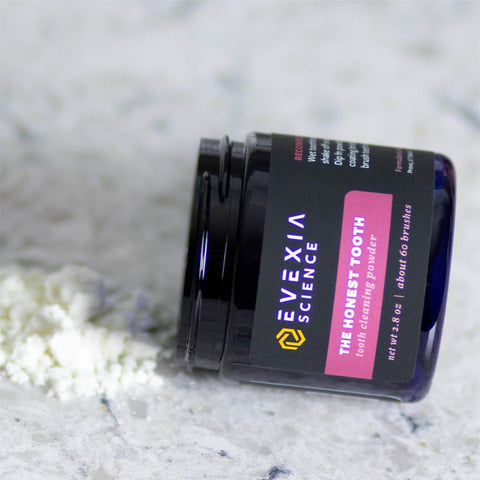
The Honest Tooth is a tooth powder that is made with 7 ingredients: baking soda, xylitol (from birch trees), monolaurin (from coconuts), and essential oils of peppermint, wintergreen, cinnamon, and clove. It is designed by combining the most effective plaque- and bacteria-fighting natural compounds to give you improved dental health, whiter teeth, and fresher breath!
My Story
One day, after I had been going to college for a few years, I went to the dental hygienist to get a checkup and he told me that I was developing gingivitis. He recommended that I start using a waterpik that alkalizes the water to clean between teeth. Being a science major, I understood the pH scale and how acids in your mouth from food and bacteria eat your teeth. I also understood that alkaline or basic minerals will neutralize acids to prevent them from being harmful. I thought baking soda is alkaline, why don’t I just start brushing my teeth with baking soda? So, I did. I started brushing my teeth with just baking soda. Eventually, I thought if I add some essential oils to it, then that will make my breath fresher and help kill bad bacteria in my mouth. So, I started doing that. Six months later I went back to the dental hygienist, and he told me that my gingivitis was almost gone! I was amazed and so I just continued to make my tooth powder with baking soda and essential oils for a while. I continued to develop my tooth powder as I learned more about chemistry. Eventually, I added xylitol powder, which has clinical studies showing that it kills bad bacteria and prevents tooth decay. I also added an enzymatic byproduct of coconuts called monolaurin, which helps remove plaque. I also did some research into which essential oils are best at killing tooth-eating bacteria and perfected my essential oil formulation.
The Problem with Dental Plaque
Plaque is a biofilm coating on your teeth that is created by bacteria. It is a natural home for bacteria that protects them from brushing, flossing, and other things that would harm them. It is that fuzzy feeling that you feel on your teeth at the end of the day. It often makes your teeth yellow and can absorb stains from your food that discolor your teeth, although stains can also be absorbed into the enamel of your teeth as well. Plaque is not healthy for your teeth. Healthy plaque-free teeth are smooth and clean. Over time plaque, if not removed, will harden into what is called calculus or tarter as it absorbs calcium from your food. This tarter becomes impossible to remove by brushing with most toothpaste varieties and must be removed by the dental hygienist. Dental plaque can cause serious problems for your health, it can lead to:
- Cavities and tooth decay [1, 2]
- A high bacterial load that can eventually spread throughout your body and damage your organs [3]
- Destruction of bone [4]
- Discolored teeth [5]
- Bad breath that doesn't go away [6]
- Inflammation [2]
- Gingivitis [2]
- Severe periodontal disease [2]
- Infections [2]
- Tooth loss [2]
Dental Plaque has also been linked to other serious diseases such as:
- Greater risk of diabetes [7]
- Greater risk of dementia [8]
- Greater risk of heart disease and heart attack [9]
That is why it is essential to remove as much plaque from your teeth as possible every time you brush your teeth. It is not enough to get it removed every six months when you visit the dental hygienist.
The Benefits
The amazing thing about The Honest Tooth is that it helps to get your teeth cleaner and whiter and your breath fresher for longer than normal toothpaste. The Honest Tooth will remove more plaque from your teeth than leading brands of toothpaste both natural and conventional. To test this out, we had people brush their teeth with their normal toothpaste and then chew a plaque stain to reveal how much plaque was left over on their teeth after brushing. The next day we had them brush with The Honest Tooth and chew the plaque stain again. The pink stains on the teeth are the left-over plaque. This first-person brushed her teeth with a natural glycerin-based herbal toothpaste. The second person brushed with Colgate and the third person brushed with Colgate and he also used an electric toothbrush.
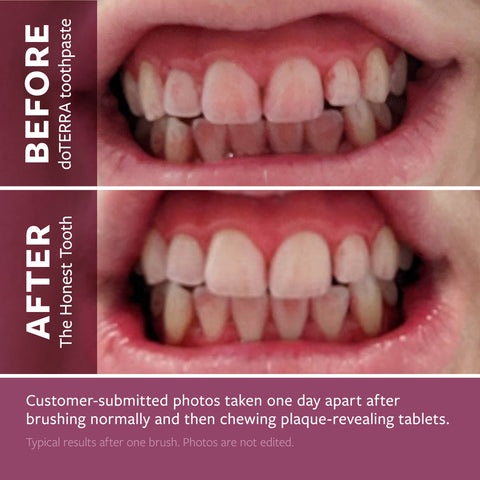
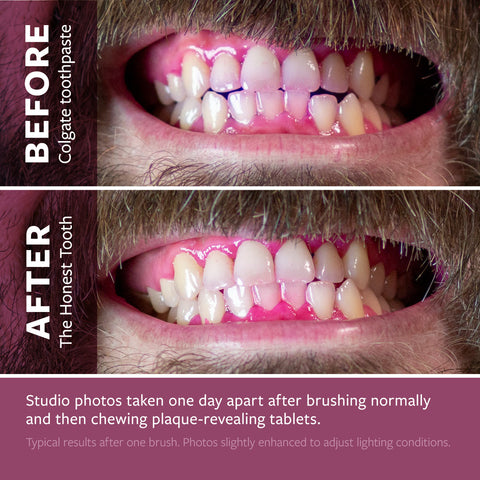
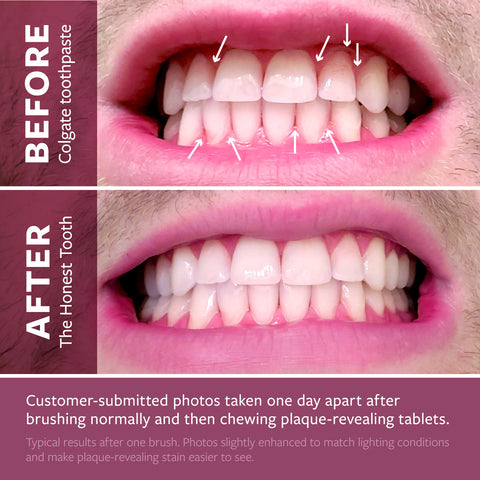
You can see from these results that the Honest Tooth removed more plaque from the teeth even when the person used an electric toothbrush. The electric toothbrush was not able to get into the crevices between the teeth, where the Honest Tooth was able to get.
Baking Soda
Baking soda helps to remove odors, polish teeth, and alkalize the mouth to neutralize tooth-eating acids and help rebuild enamel to prevent cavities and improve the structure of your teeth. [10] Acids are very damaging to your teeth. They will weaken the enamel and allow bacteria to get into your teeth to cause cavities. Alkaline products, like baking soda, will react with acids to neutralize them and protect your teeth. When you eat sugar, bacteria eat those sugars and create acids. Also, whenever you eat acidic foods like vinegar, lemon juice, cola sodas, or acidic fruits like kiwis, citrus, or others, those acids attack your enamel and soften your teeth. That means that when you are eating your favorite salad with your healthy vinaigrette, you are softening your teeth and increasing tooth sensitivity and the chances of cavities. The baking soda in The Honest Tooth helps to protect your enamel by neutralizing those tooth-eating acids. Baking soda also will help to remineralize your teeth by replacing hydroxides (oxygen-hydrogen molecules) that the acids stole from your teeth.
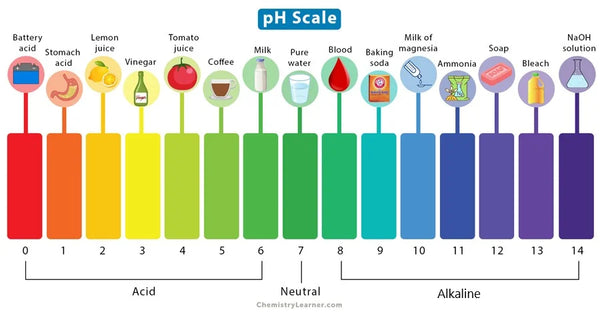
A systemic review of 21 studies involving baking soda in toothpaste found that baking soda caused a significant reduction in plaque, gingivitis, and gum bleeding scores compared to both positive and negative controls. [11]
Xylitol
Xylitol is a sugar alcohol. Not to be confused with regular alcohol that people drink or use for hand sanitizer, and not to be confused with table sugar either, sugar-alcohol is a hybrid. It does not make you drunk, and it doesn’t have any calories. It also will not feed bacteria or yeast it does the opposite, xylitol has anti-microbial properties. Xylitol has been well-studied for its antimicrobial effects. That is why it is used in so many toothpaste, chewing gum, and other dental products. Xylitol has many studies showing that it reduces tooth decay by killing the bacteria that causes tooth erosion, Streptococcus Mutans. [12–15]
Essential oils
The Honest Tooth also contains essential oils of peppermint, wintergreen, cinnamon, and clove. Peppermint and wintergreen provide a nice flavor and freshness to your mouth after you use it. Cinnamon and clove essential oils have studies showing that they kill the tooth cavity-causing bacteria S. Mutans just like xylitol does. [16–21]
Monolaurin
Monolaurin is the secret ingredient in The Honest Tooth that you won’t find in any other tooth powder or paste. Monolaurin is derived from coconuts. Coconut oil does not contain monolaurin alone but must be enzymatically processed to get monolaurin. The secret to monolaurin is that it helps to remove a lot more plaque than any other ingredient. Monolaurin gets into the plaque and breaks it up to make it easier to remove. Monolaurin has several benefits for dental health. Not only is it antimicrobial [22–24] and anti-inflammatory, but it’s also incredible at removing plaque quickly without damaging gums or enamel, unlike sodium lauryl sulfate.
In two studies, rats were given a high-sugar diet and exposed to S. mutans. They were then given either a normal diet or one that contained monolaurin for 21 days. The scientists then measured the number of cavities in the rats and found that the rats given the monolaurin had significantly fewer[25, 26]. Invitro studies on monolaurin have demonstrated its ability to dissolve bacterial biofilms (plaque). Unfortunately, to date, no published human studies have been done specifically on the effects of monolaurin on dental health, but the in-vitro and rat study results are promising.
The Honest Tooth
The Honest Tooth powder is an alternative to toothpaste that cleans the teeth better than any paste or powder. It uses the power of baking soda, xylitol, monolaurin, and essential oils to help to eliminate harmful bacteria and yeast that are the cause of bad breath and tooth decay. The Honest Tooth will get your teeth whiter, remove more plaque, and get your breath fresher! Learn more about The Honest Tooth (and check out our video on our cleaning power compared to Crest) on the product page.
Learn more about The Honest Tooth by clicking here
► References
- Jakubovics, N. S.; Goodman, S. D.; Mashburn-Warren, L.; Stafford, G. P.; Cieplik, F. The Dental Plaque Biofilm Matrix. Periodontol. 2000, 2021, 86 (1), 32–56. https://doi.org/10.1111/prd.12361.
- Seneviratne, C. J.; Zhang, C. F.; Samaranayake, L. P. Dental Plaque Biofilm in Oral Health and Disease. Chin. J. Dent. Res. Off. J. Sci. Sect. Chin. Stomatol. Assoc. CSA, 2011, 14 (2), 87–94.
- Gum disease and heart disease: The common thread https://www.health.harvard.edu/heart-health/gum-disease-and-heart-disease-the-common-thread (accessed Jul 12, 2023).
- Usui, M.; Onizuka, S.; Sato, T.; Kokabu, S.; Ariyoshi, W.; Nakashima, K. Mechanism of Alveolar Bone Destruction in Periodontitis — Periodontal Bacteria and Inflammation. Jpn. Dent. Sci. Rev., 2021, 57, 201–208. https://doi.org/10.1016/j.jdsr.2021.09.005.
- Tooth Discoloration: In-Office & At-Home Treatment https://my.clevelandclinic.org/health/diseases/10958-tooth-discoloration (accessed Jul 12, 2023).
- The Sticky Truth About Dental Plaque https://my.clevelandclinic.org/health/diseases/10953-plaque (accessed Jul 12, 2023).
- Mohamed, H. G.; Idris, S. B.; Ahmed, M. F.; Bøe, O. E.; Mustafa, K.; Ibrahim, S. O.; Åstrøm, A. N. Association between Oral Health Status and Type 2 Diabetes Mellitus among Sudanese Adults: A Matched Case-Control Study. PLoS ONE, 2013, 8 (12). https://doi.org/10.1371/journal.pone.0082158.
- https://www.facebook.com/NIHAging. Large Study Links Gum Disease with Dementia | NIA https://www.nia.nih.gov/news/large-study-links-gum-disease-dementia (accessed Jul 25, 2023).
- Kowolik, M. J.; Dowsett, S. A. Leukocyte Response to Dental Plaque Accumulation: A Risk Factor for Heart Disease? Arch. Intern. Med., 2005, 165 (15), 1795–1796. https://doi.org/10.1001/archinte.165.15.1795-c.
- Baking soda dentifrices and oral health - The Journal of the American Dental Association https://jada.ada.org/article/S0002-8177(17)30822-X/fulltext (accessed Nov 12, 2021).
- Valkenburg, C.; Kashmour, Y.; Dao, A.; Fridus Van der Weijden, G. A.; Slot, D. E. The Efficacy of Baking Soda Dentifrice in Controlling Plaque and Gingivitis: A Systematic Review. Int. J. Dent. Hyg., 2019, 17 (2), 99–116. https://doi.org/10.1111/idh.12390.
- Ahuja, V.; Macho, M.; Ewe, D.; Singh, M.; Saha, S.; Saurav, K. Biological and Pharmacological Potential of Xylitol: A Molecular Insight of Unique Metabolism. Foods, 2020, 9 (11), 1592. https://doi.org/10.3390/foods9111592.
- Loimaranta, V.; Mazurel, D.; Deng, D.; Söderling, E. Xylitol and Erythritol Inhibit Real-Time Biofilm Formation of Streptococcus Mutans. BMC Microbiol., 2020, 20 (1), 184. https://doi.org/10.1186/s12866-020-01867-8.
- Salli, K.; Lehtinen, M. J.; Tiihonen, K.; Ouwehand, A. C. Xylitol’s Health Benefits beyond Dental Health: A Comprehensive Review. Nutrients, 2019, 11 (8), E1813. https://doi.org/10.3390/nu11081813.
- Söderling, E.; Pienihäkkinen, K. Effects of Xylitol and Erythritol Consumption on Mutans Streptococci and the Oral Microbiota: A Systematic Review. Acta Odontol. Scand., 2020, 78 (8), 599–608. https://doi.org/10.1080/00016357.2020.1788721.
- Gandhi, H. A.; Srilatha, K. T.; Deshmukh, S.; Venkatesh, M. P.; Das, T.; Sharieff, I. Comparison of Antimicrobial Efficacy of Cinnamon Bark Oil Incorporated and Probiotic Blend Incorporated Mucoadhesive Patch against Salivary Streptococcus Mutans in Caries Active 7-10-Year-Old Children: An In Vivo Study. Int. J. Clin. Pediatr. Dent., 2020, 13 (5), 543–550. https://doi.org/10.5005/jp-journals-10005-1818.
- Lapinska, B.; Szram, A.; Zarzycka, B.; Grzegorczyk, J.; Hardan, L.; Sokolowski, J.; Lukomska-Szymanska, M. An In Vitro Study on the Antimicrobial Properties of Essential Oil Modified Resin Composite against Oral Pathogens. Mater. Basel Switz., 2020, 13 (19), E4383. https://doi.org/10.3390/ma13194383.
- Wiwattanarattanabut, K.; Choonharuangdej, S.; Srithavaj, T. In Vitro Anti-Cariogenic Plaque Effects of Essential Oils Extracted from Culinary Herbs. J. Clin. Diagn. Res. JCDR, 2017, 11 (9), DC30–DC35. https://doi.org/10.7860/JCDR/2017/28327.10668.
- Ács, K.; Balázs, V. L.; Kocsis, B.; Bencsik, T.; Böszörményi, A.; Horváth, G. Antibacterial Activity Evaluation of Selected Essential Oils in Liquid and Vapor Phase on Respiratory Tract Pathogens. BMC Complement. Altern. Med., 2018, 18 (1), 227. https://doi.org/10.1186/s12906-018-2291-9.
- Khan, M.; Alkhathlan, H. Z.; Khan, S. T. Antibiotic and Antibiofilm Activities of Salvadora Persica L. Essential Oils against Streptococcus Mutans: A Detailed Comparative Study with Chlorhexidine Digluconate. Pathogens, 2020, 9 (1), 66. https://doi.org/10.3390/pathogens9010066.
- Assessment of Antimicrobial Effectiveness of Neem and Clove Extract Against Streptococcus mutans and Candida albicans: An In vitro Study - PubMed https://pubmed.ncbi.nlm.nih.gov/32180657/ (accessed Dec 6, 2021).
- Ham, Y.; Kim, T.-J. Inhibitory Activity of Monoacylglycerols on Biofilm Formation in Aeromonas Hydrophila, Streptococcus Mutans, Xanthomonas Oryzae, and Yersinia Enterocolitica. SpringerPlus, 2016, 5 (1), 1526. https://doi.org/10.1186/s40064-016-3182-5.
- Schlievert, P. M.; Kilgore, S. H.; Seo, K. S.; Leung, D. Y. M. Glycerol Monolaurate Contributes to the Antimicrobial and Anti-Inflammatory Activity of Human Milk. Sci. Rep., 2019, 9 (1), 14550. https://doi.org/10.1038/s41598-019-51130-y.
- Ka, W.; Br, S.; Jl, M.; Gk, S.; S, K. Influence of Selected Fatty Acids upon Plaque Formation and Caries in the Rat. Arch. Oral Biol., 1982, 27 (12). https://doi.org/10.1016/0003-9969(82)90007-3.
- Ka, W.; Br, S.; Jl, M.; Gk, S.; S, K. Influence of Selected Fatty Acids upon Plaque Formation and Caries in the Rat. Arch. Oral Biol., 1982, 27 (12). https://doi.org/10.1016/0003-9969(82)90007-3.
- P, L.; Ra, S.; Jj, K. Anticariogenicity of Dietary Glycerol Monolaurin in Rats. Caries Res., 1983, 17 (2). https://doi.org/10.1159/000260661.

